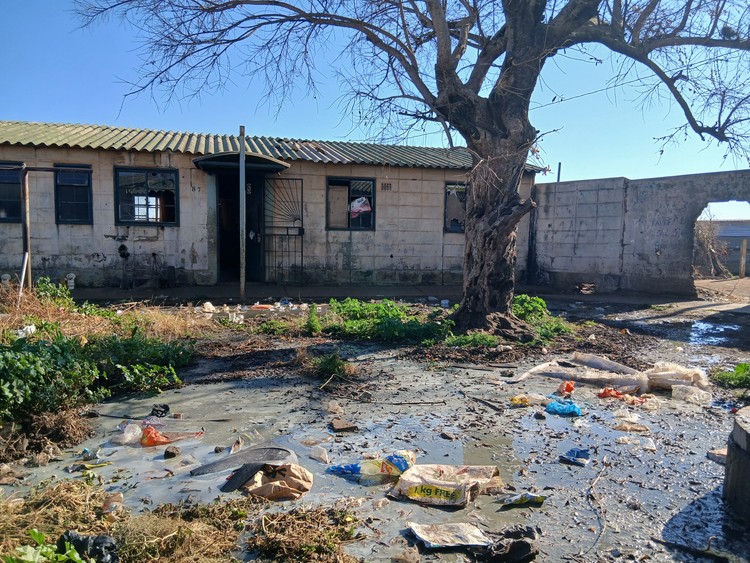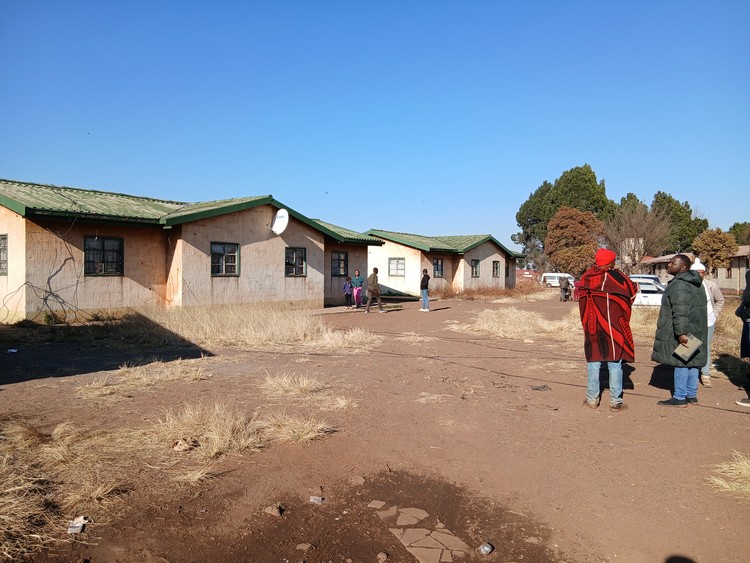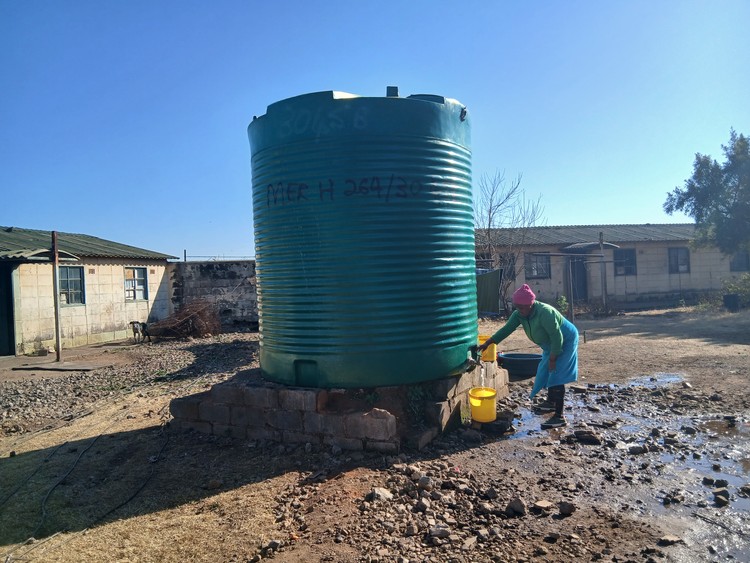Millions were spent to relocate these families, but they still live in squalor
Gauteng Department of Human Settlements spent R78-million on plans that never materialised
Residents at Khutsong Hostel in Carletonville, Gauteng say they live in deplorable conditions as the hostel’s walls have deep cracks, windows are broken, and sewage frequently overflows onto their doorsteps. The hostel is also metres away from a massive sinkhole. Photos: Silver Sibiya
- Families living at Khutsong Hostel in Carletonville say their living conditions have been deteriorating.
- The community is battling water supply issues, sewage leakages and life without electricity.
- The hostel is metres away from a massive sinkhole, which is a common occurrence in the area.
- R78-million was spent to plan a government project to relocate the affected households, but nothing ever came of it.
For more than 10 years, the living conditions at Khutsong Hostel in Carletonville have been deteriorating. The hostel is also metres away from a massive sinkhole, which is a common occurrence in the area.
In addition to infrastructure failures, the community is also battling water supply issues, sewage leakages and life without electricity.
Around 2018, the Gauteng Department of Human Settlements spent about R78-million on the planning, surveying and engineering designs for a project to relocate residents whose homes were affected by the sinkholes, including Khutsong Hostel.
The department said an additional R83-million would be allocated to the project, but this amount was conditional on the municipality committing to funding bulk services in the area.
Merafong local municipality spokesperson Thabo Moloja told GroundUp that the project recently ground to a halt because the municipality did not have enough funds to provide bulk infrastructure services for the proposed relocation site.
Meanwhile, residents say they are living in deplorable conditions as the hostel’s walls have deep cracks, windows are broken, and sewage frequently overflows onto their doorsteps. It is currently home to about 1,500 people.
Because there’s no running water, residents are forced to relieve themselves in the bushes surrounding the hostel, leaving a terrible stench in the air.
Nqobile Vilakazi has lived in the hostel for 23 years. She said they previously paid up to R208 per month in rent and had access to running water and electricity. But the situation began to deteriorate, and residents stopped paying. They then stopped getting running water, and the electricity had been tampered with through illegal connections made by the nearby informal settlement.
About 1,500 people currently live in this hostel.
“They were connecting to our electricity by force, and we couldn’t stop them … Eskom came to cut off electricity because of the illegal connections. They said we owed a lot of money,” said Vilakazi.
She said many hostel families now also connect their flats illegally to electricity from the neighbouring RDP houses.
“We just want a decent life for our children not to grow up like this,” she said.
Mother of two, Bongiswa Dlamini, who moved into the hostel in 2019, said she has nowhere else to live with her children.
She complained that the municipal water truck comes to the hostel inconsistently to refill the two large water tanks. “Sometimes we go two weeks without water because the truck doesn’t come,” she said.
Community leader Thokozani Nkabinde confirmed that a private contractor had come around to inspect the hostel years ago and had allegedly recommended that the building be demolished.
“The company recommended that a new structure be built in Extension 8 because there are sinkholes near the hostel.”
He questioned why the municipality has not been forthcoming with updates on the project. “People are living in inhuman conditions. Children are forced to be streetwise from an early age because they are taught how to look out for live power cables in the roads,” said Nkabinde.
Gauteng Department of Human Settlements spokesperson Tahir Sema told GroundUp, “The department is acutely aware of the unsafe conditions at Khutsong Hostel. Due to the risk of sinkholes in the area, in-situ upgrades are not possible.”
Asked about residents’ current living conditions, Sema said, “there are no immediate interventions planned” because it is not part of the department’s priority list for this year.
“Any action related to Khutsong Hostel is currently constrained by geotechnical risks, municipal dependencies, and budget allocations. The long-term solution remains the relocation of residents to safe and properly serviced housing,” he said.
Residents complain that the municipal truck delivers water inconsistently to the hostel, often leaving them without water for at least two weeks.
Support independent journalism
Donate using Payfast

Don't miss out on the latest news
We respect your privacy, and promise we won't spam you.
Next: Hundreds of households in Kariega left in the dark
Previous: South Africa’s first blind soccer league kicks off in Joburg
© 2025 GroundUp. This article is licensed under a Creative Commons Attribution-NoDerivatives 4.0 International License.
You may republish this article, so long as you credit the authors and GroundUp, and do not change the text. Please include a link back to the original article.
We put an invisible pixel in the article so that we can count traffic to republishers. All analytics tools are solely on our servers. We do not give our logs to any third party. Logs are deleted after two weeks. We do not use any IP address identifying information except to count regional traffic. We are solely interested in counting hits, not tracking users. If you republish, please do not delete the invisible pixel.



